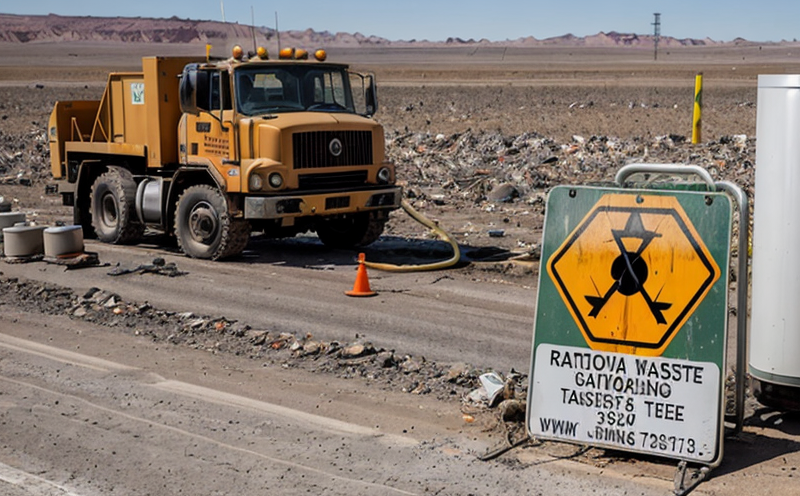ISO 18589-11 Fallout Radionuclides in Waste Storage Areas
The International Organization for Standardization's (ISO) ISO 18589 series provides a comprehensive framework for the analysis of radionuclides in waste storage areas. Specifically, Part 11 focuses on fallout radionuclides, which are crucial for ensuring that radioactive materials do not escape into the environment or pose risks to human health and safety.
The standard is designed to be applied in various sectors such as nuclear power plants, decommissioning sites, and waste management facilities. It ensures compliance with international regulations and serves as a benchmark for quality assurance in the testing of radioactive materials.
To achieve this, ISO 18589-11 mandates detailed procedures for sampling, preparation, and analysis of waste material samples. The standard covers a wide range of fallout radionuclides, including but not limited to cesium-137 (Cs-137), strontium-90 (Sr-90), and plutonium isotopes. These radionuclides are particularly important because they have long half-lives and can migrate through the environment over extended periods.
The testing process involves several key steps, each designed to ensure accuracy and precision in the results:
- Sampling: Samples must be collected from designated storage areas using techniques that minimize contamination. Proper sampling is critical for obtaining representative data.
- Preparation: The samples are then prepared according to strict protocols, ensuring they are in a form suitable for analysis.
- Instrumentation: Advanced instrumentation such as gamma spectrometry and mass spectrometry is used to detect and quantify the radionuclides present. These instruments provide precise measurements of the isotopic concentrations.
The results from these analyses are then compared against regulatory limits set by organizations like the International Atomic Energy Agency (IAEA) and national standards. Compliance with these limits ensures that waste storage areas remain safe and do not pose an environmental risk.
One of the main challenges in testing fallout radionuclides is ensuring that the sampling and analysis processes are as accurate as possible, given the low levels at which these materials can be detected. ISO 18589-11 provides detailed guidelines to address this challenge, including best practices for minimizing contamination and maximizing sample integrity.
Another critical aspect of the standard is its emphasis on traceability and reproducibility. The results from different laboratories should be comparable, which is why strict protocols are outlined in ISO 18589-11 to ensure consistent testing methods across various facilities.
In addition to the technical aspects of the test, there are also important considerations for personnel safety. Handling radioactive materials requires specialized training and equipment to protect both the testers and the environment. ISO 18589-11 includes guidelines on personal protective equipment (PPE) and procedures for safe handling.
The standard's emphasis on quality control is further reflected in its requirement for laboratories to undergo proficiency testing programs. These programs ensure that labs maintain their expertise and can consistently produce reliable results.
Eurolab Advantages
At Eurolab, we pride ourselves on offering a wide range of services designed to meet the stringent requirements of ISO 18589-11. Our team of experts ensures that every aspect of the testing process is conducted with precision and care.
- Expertise: Our staff are highly trained in all aspects of radioactive waste analysis, including sampling, preparation, instrumentation, and interpretation of results.
- Technology: We utilize state-of-the-art equipment such as advanced gamma spectrometers and mass spectrometers to ensure accurate measurements.
- Compliance: Eurolab is committed to ensuring that our testing aligns with international standards, including ISO 18589-11.
- Consistency: Our proficiency testing programs guarantee consistent and reliable results across all of our tests.
We also offer additional services to support clients beyond the basic testing requirements. These include:
- Training for personnel handling radioactive materials.
- Consultation on best practices for waste management and storage.
- Support in developing internal quality control programs.
Customer Impact and Satisfaction
Our commitment to excellence has led to high levels of customer satisfaction. By adhering strictly to ISO 18589-11, we ensure that our clients receive accurate and reliable results every time.
Customers benefit from:
- Peace of Mind: Knowing that their waste storage areas are compliant with international standards provides a sense of security for both the facility operators and regulatory bodies.
- Cost Efficiency: By ensuring compliance on the first attempt, our services help avoid costly rework or remediation efforts.
- Regulatory Compliance: Our expertise helps clients navigate complex regulations and ensure they are in full compliance with international standards.
We also offer ongoing support to our clients through regular updates on best practices, training sessions, and consultation services. This ensures that our customers stay ahead of the curve and can adapt to new regulatory requirements as needed.
Competitive Advantage and Market Impact
By offering comprehensive ISO 18589-11 testing services, Eurolab provides a competitive advantage for our clients. Here are some of the ways we impact the market:
- Innovation: Our expertise and adherence to international standards encourage innovation in waste management practices.
- Reputation: Clients trust Eurolab's reliability, leading to increased business opportunities and stronger reputations for our clients.
- Sustainability: By ensuring that radioactive materials are managed safely and responsibly, we contribute positively to environmental sustainability.
Our services play a crucial role in maintaining public trust and confidence in nuclear safety. This is particularly important given the increasing focus on environmental protection and sustainable practices globally.





